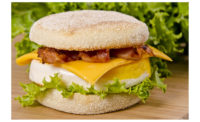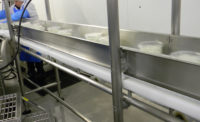
They say that change is inevitable, but if recent developments at Unilever United States are any example, they also could say that change is incredible.
That's because Unilever U.S., Englewood Cliffs, N.J., is making a host of positive adjustments to its $10 billion brigade of consumer packaged good brands. And it's no accident that these changes are reaping serious rewards not only for the company - but also customers and consumers.
"The exciting thing is that we are really putting the consumer and the customer at the heart of everything we do," says Lisa Klauser, vice president of Consumer and Customer Solutions. "And my role is to be right in the middle of that."
For that matter, Klauser and others are squarely in the middle of a tremendously diverse product portfolio at Unilever. The U.S. operation's offerings include such food brands as, Country Crock, Skippy, Lipton, Bertolli, Promise, Knorr, Breyer's, Ben & Jerry's and others. And then there are health and beauty brands, such as Dove, Caress and Vaseline. Nationwide, Unilever employs approximately 13,000 people at more than 60 offices and manufacturing sites.
Speaking of change, however, it should also be noted that Unilever Plc/NV, headquartered in both London and Rotterdam, Netherlands, has forged ahead with plans to streamline and simplify its operations globally. Since Unilever Plc/NV's Group Chief Executive Patrick Cescau launched the "One Unilever" program in 2004, the company has dramatically altered its stateside business. The company integrated its ice cream unit last fall into its U.S. sales operation and has since moved those operations to Englewood Cliffs where the rest of its food businesses are housed along with several home and personal care brands (the company operates its Deodorant and Hair Care business out of Chicago).
This April saw Unilever form a singular U.S. Foods Business Team headed by Amanda Sourry, a 19-year company veteran and now senior vice president. Sourry most recently was vice president and general manager of Meal Solutions and New Vitality.
For her part, Sourry anticipates putting Unilever's vitality mission, "help consumers look good, feel good and get more out of life" into action through food product innovations.
"In developing new food products and entering or expanding categories, we are driven by the Unilever vitality mission," she says. "Our strategy for growth of our food portfolio focuses on our ability to generate and implement a stream of consumer relevant products and to develop our brands in ways that are distinctive and drive profitable category growth for our customers."
Earlier this year, Unilever named Klauser, formerly vice president of Brand Building and Marketing Excellence, to her current post. Both Klauser and Sourry report to Kevin Havelock, President Unilever U.S.
A 15-year Unilever veteran with previous experience at Kraft, Nestle and Proctor & Gamble, Klauser now heads Unilever's shopper insight, shopper marketing and category management teams, among her responsibilities. She indicates that with greater simplicity, coordination and teamwork, Unilever actually is pushing even deeper into market insights.
"We're putting a lot of work around understanding shopping behavior and understanding how people decide where to shop, what's happening with channel shifting, how consumers are navigating the store, choosing the items and really completing the purchase the process," she says.
"My team is very focused on working closely with customers to make sure that we're taking what we know and then translating it into big wins for us and the customer," Klauser explains.
Perhaps most importantly, Unilever has taken and applied its knowledge of customer and consumer needs to enter some entirely new retail categories.
Italian appeal
One of Unilever's biggest wins no doubt has come in the freezercase in successful product launches. Brian Manning is the senior marketing director of Unilever chilled and frozen and led the team that launched Bertolli frozen dinners in 2005. He notes that - before launching the brand extension - Unilever identified a growing demographic with a need for premium, convenient, restaurant-quality frozen meals."There were a number of things Unilever had been looking at and one of those was the rise in the number of two-person households in the U.S.," he says. "Today there are 33 percent two-person households and they are growing at a double-digit rate."
Manning adds that Bertolli frozen's premium skillet meals contain two servings per 24-ounce package and cook in 10 minutes or less, making them an ideal dinner for a two-person household.
The fact that the product is marketed as "restaurant-quality" helps it earn appeal as well.
"Bertolli frozen dinners are a great value when compared to the price of a restaurant meal," Manning says. "Recent evidence supports this insight with the number of restaurant-purchased meals declining in 2007, the first time in many years."
In 2006, Bertolli nabbed the leading premium frozen multi-serve dinner market share and has held on to it since. In fact AC Nielsen data shows Bertolli dollar sales up 47 percent for the year ending 2007(food, drug, and mass merchandiser stores excluding Wal-Mart). That said, Manning still insists what is really important to him and the brand is category growth.
"The category growth rate has been well over double-digit since our national launch," Manning says proudly. "The category is on track to nearly double in size by year-end."
This spring, Bertolli frozen will launch six new products - a Mediterranean steak, portobello mushroom and rigatoni pasta variety, a roasted pork with cavatappi pasta variety and four filled pasta and sauce varieties. These offerings will join 18 others for a 24-item line that consists of: Classic Dinners (typical Italian fare), Mediterranean Style (made with extra virgin olive oil, lighter sauces and more fresh vegetables) and Complete Pasta & Sauce (pasta and sauce only). Each meal contains individually quick frozen vegetables, proteins, sauce pucks and pastas.
Manning adds that the brand isn't finished growing. "We see continued strong growth potential for Bertolli as the leader of the multi-serve frozen dinners category," he says.
Shots of success
The freezercase is far from the only part of the store in which a recent Unilever launch is nudging category growth. Promise activ SuperShots - mini-drinks, infused with plant sterols that aid in heart health by reducing the amount of cholesterol in the body - were virtual pioneers in the U.S. fortified mini-drink platform. The products are now appearing on retailer's chiller shelves, next to yogurt and kefir.Eric Berman is the brand director for Promise activ SuperShots and an eight-year Unilever team member.
"We've seen in all of our consumer research that consumers react positively to our SuperShots in that they help [consumers] take control of their health," he says.
Doug Balentine, director of nutrition sciences for Unilever in the Americas, worked on the team that developed the scientific basis for Promise activ SuperShots.
"We're constantly working to get an understanding of consumers and what their needs and concerns are," he says.
"Cholesterol management is something that is a concern globally," Balentine continues. "But what we found was that consumers said they needed a simple, easy way to get plant sterols on a daily basis."
Unilever Plc/NV had success with the mini-drink platform in Europe, where vitality shots first took off. This - combined with Promise's brand equity - set up the perfect catalyst for Promise activ SuperShots.
"We had the Promise brand, which has been very innovative in terms of heart health. It really made a lot of sense for us," Balentine explains. "And since the launch, it's been very successful."
So successful, in fact, that Berman says the mini-drink category is "exploding." SuperShots have hit all of Unilever's financial goals and sales show no sign of slowing, he adds.
"It's a really hot part of the store. Retailers love it because of the incrementality. We found that consumers will seek [the mini-drinks] out and make shopping decisions based on the availability of some of these products."
This winter, Unilever added Blueberry to the existing flavors (Strawberry, Peach and Raspberry) and will launch Promise activ SuperShots for Blood Pressure - a new variety - in June.
"More than one-third of Americans are hypertensive and the No. 1 issue when you're dealing with hypertension and high blood pressure is reducing sodium in your diet. It's very difficult to cut sodium. One of the best ways to do this is adding foods rich in potassium - potassium flushes sodium from the body," Berman says.
"Promise activ SuperShots is a true innovation - it's the first functional shot that delivers 350mg potassium in a single dose - as much potassium as a small banana, but with only 60 calories or less."
The Blood Pressure shots will be available in Strawberry Banana, Mixed Berry and Peach Apricot varieties.
"We've seen in a lot of the consumer research that we've done that there is a real positive response in that we're doing something beneficial for people to have control of their health," Berman adds.
As consumers continue to look for ways to take positive steps toward improving their health through food choices - the mini-drink category increasingly will expand, he predicts.
"We are finding that it's very much benefit driven. The category will really prosper by incremental benefits - different benefits for different people - and I think blood pressure and cholesterol are great examples of that."
He concludes theR&FFinterview with a goal for the brand, "We are hoping that we can create a billion dollar retail category, including a variety of different vitality shots within 10 years."
Spread the health
While vitality drink shots are a new category for Unilever, the company has been no less active in its more mature product areas. Officials say they're using cutting-edge consumer insights to refresh and extend Unilever's spreads business, where the company already enjoys more than a 54 percent value share of the margarine spreads category (per AC Nielsen).Keith Bobier is the senior marketing director of the spreads category and has been with Unilever for 20 years.
"From spreads, consumers are looking for great taste and spreadability - and increasingly they are looking for health. If we look at the broader spread category, the products and the brands that have really accelerated to the forefront are the ones that offer 'something else,'" he says.
But before adding that "something else," Unilever made sure to take something out. All of Unilever's soft spreads are trans fat free. The company was a pioneer in removing trans fats from these spreads, Balentine says.
"A little more than 10 years ago, it became clear to us as a company that having a lot of trans fats in our soft spreads products was not something that we should be doing - particularly when our whole spreads business was about health and being more heart healthy," he explains.
Bobier adds that it's only been a natural progression for the spreads to continue along this path - especially as consumers have demonstrated a need for it in the marketplace.
Although each brand has a different target demographic and marketing slant - healthy formulation is the common thread.
"They all are quite healthy. What we're trying to do is evolve them because consumers are looking for these kinds of changes. We try to add new health variants to each line," Bobier explains.
Of all the brands, Promise most emphasizes heart health. The buttery spreads feature the slogan "Love Your Heart" and contain omega-3 ALA, omega 6 and vitamin E. New packaging for each of the Promise soft spreads is shipping to stores now and reads "Cardiologist Endorsed" - a particular source of pride for the company.
"In September 2007, we went to 300 cardiologists in a blind study and gave them the nutritional profile of our product and the nutritional profile of competitive products," Bobier says. "We asked them, 'Which is the heart healthiest? And, which would you recommend to your patients who are concerned about heart health?' Nine out of 10 chose Promise."
Promise no doubt owes this endorsement to having lower saturated fat and no trans fats as compared to competition. Unilever's reformulation of the product a year and a half ago also added a stronger dose of omega-3 ALAs.
Similarly, a new variety of Country Crock recently got a fresh smattering of nutrients. Country Crock Omega Plus hit stores this spring. The regular variant is fortified with 500 mg of omega-3 ALA per serving (a light version also is available).
"The Country Crock brand is all about getting people to make small changes in their lives. We don't preach to them and tell them to change their diets radically - we take a product that is traditional and beloved by them and we just add a little touch," Bobier says.
Meanwhile, in 2006, I Can't Believe It's Not Butter! also launched a new variant - I Can't Believe It's Not Butter! Mediterranean Blend made with olive oil and high in omega-3 ALA as well, Bobier says.
Each of these spread innovations has helped to drive spread category interest as a whole, he says, adding that customers and consumers should expect to see more from Unilever spreads.
"That's not the end of it, we have a series of innovations and virtually everything we look to add has some health benefit to it," he says.
Then he concludes, "To me, the remarkable thing is how Unilever - through its entire portfolio - has maintained dominance in the category by segmenting the market, listening to different consumer groups, understanding what they want, catering to their needs and having the right products for the various constituencies, priced right."
Bobier's description of Unilever's spreads business could aptly be applied to the company's refrigerated and frozen business overall. Unilever has established itself as an aggressive and growing leader in each of its frozen and chilled categories.
Says Klauser, "We're really about how to drive incremental growth for our customers and, obviously, for Unilever. We want to delight our customers every day with high quality products - that's very important to us. We want to be good partners to our customers and we want to be thought of as leaders and pace setters for growth."
Side bar: "Side" Note
They may be served on the "side," but Unilever's Country Crock Side Dishes surely deserve some attention. Here, Brian Manning, senior marketing director of Unilever chilled and frozen, discusses how the refrigerated line has grown since its 2004 launch.R&FF: Unilever certainly has helped propel the chilled side dish category. Can you provide a little history about the Country Crock line?
Brian Manning:: We continued to see consumer demand for convenience food products increasing, and in the case of chilled sides, there weren't any leading national brands driving category development. So, we launched Country Crock, a nationally advertised brand starting out with four items in late 2004.
The great thing about our side dish line is that consumers can use [its various offerings] with other convenience-oriented entrees or they are a perfect shortcut to complete the meal when cooking fresh proteins.
R&FF: What were the challenges with getting the Country Crock Side Dishes off the ground?
Manning: While we had experience with a chilled supply chain, these products were shorter code than anything we had marketed previously. We worked very closely with our customers to ensure a high level of service.The Country Crock brand was a natural extension into these side dishes, as the brand always has stood for country fresh taste. The products taste great and save consumers a lot of time.
R&FF: How has the chilled side dish category changed in the last few years?
Manning: The category is still relatively young, and is experiencing explosive growth. Retailers have really embraced chilled sides and meal solutions as a strategic thrust to battle restaurant take-out.
R&FF: What are your goals for this product line?
Manning:: Despite the high growth rates the last few years, household penetration is still relatively low with consumers still only purchasing about three units per year. We believe there is a lot of growth potential and that Country Crock can be a leader in driving it.
R&FF: How has the Country Crock Side Dishes line evolved?
Manning: In 2006, we launched Deluxe, a higher quality line that sells at a premium price point with more complex recipes, such as Cheddar Broccoli Rice and Scalloped Potatoes. We also have a successful line of seasonal items that includes sweet potatoes and stuffing. We continue to innovate and our line now stands at 10 sides plus three seasonal items.
At a glance: Unilever United States
Address:800 Sylvan Ave., Englewood Cliffs, N.J. 07632Employees:More than 14,000 in U.S. and Puerto Rico
Leaders: Kevin Havelock, president Unilever U.S.; Amanda Sourry, senior vice president and general manager of the U.S. Foods group
2007 annual sales (including HBC brands):Nearly $11 billion
Refrigerated and frozen businesses and brands:
Ice cream, frozen yogurt and frozen novelties:Ben & Jerry's, Breyer's, Good Humor, Klondike, Popsicle
Spreads:Country Crock, I Can't Believe It's Not Butter!, Promise
Chilled side dishes:Country Crock
Frozen meals:Bertolli
Mini-drinks:Promise activ SuperShots
Beverages:Lipton (ready-to-drink tea)
Shelf-stable food brands: Bertolli, Hellman's, Knorr, Lawry's, Lipton, Ragu, Skippy, Slim Fast, Unilever Food Solutions, Wish-Bone
Parent company:Unilever Plc/NV
Headquarters: London and Rotterdam, Netherlands
Leader: Patrick Cescau, group chief executive
2007 annual sales: Approximately $55 billion


